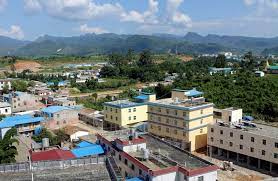Dr. Azeem Ibrahim
In a stunning turn of events, the Myanmar military’s Regional Operations Command in Laukkai last week surrendered to the Myanmar National Democratic Alliance Army, marking a significant and unexpected shift in the ongoing conflict. The implications of this surrender, coupled with the Three Brotherhood Alliance’s rapid gains across northern Shan state, pose a major problem for the military in the northern region and present a formidable challenge for junta chief Gen. Min Aung Hlaing.
The fall of the Laukkai command to the Myanmar National Democratic Alliance Army, a prominent ethnic armed group, underscores the volatile nature of the military’s hold on power. Laukkai, a key strategic outpost, was considered a stronghold for the Tatmadaw, Myanmar’s military. The surrender means not only a loss of territory, but it also lands a blow on the military’s morale and is an assertion of the rebels’ resilience.
The Three Brotherhood Alliance, consisting of the Myanmar National Democratic Alliance Army, the Ta’ang National Liberation Army and the Arakan Army, has capitalized on this momentum, making rapid gains across northern Shan. Their coordinated efforts have seen them overrun hundreds of military outposts, seize key towns and take control of crucial border crossings with China. The rebels’ success not only demonstrates their military capabilities but also showcases the fragility of the military’s control over the northern territories. This strategic setback is a major concern for Hlaing. The northern region has been a historically challenging battleground due to its complex ethnic composition and long-standing grievances against the central government. The Three Brotherhood Alliance’s gains have emboldened not only these ethnic armed groups but also other dissident factions, creating a domino effect that could destabilize the junta’s grip on power.
One of the key reasons behind the rebels’ success is the support they receive from local communities. The military’s heavy-handed approach, characterized by human rights abuses and indiscriminate violence, has fueled resentment among the population. The people of northern Shan, long marginalized and oppressed, see the rebels as a force that represents their aspirations for autonomy and self-determination.
The junta’s inability to win hearts and minds in the region has turned the conflict into a battle for legitimacy, in which the Three Brotherhood Alliance holds a distinct advantage. China’s role in the conflict cannot be overlooked. The rebels’ control of key border crossings with China is a significant development. Beijing, which is traditionally hesitant to intervene in Myanmar’s internal affairs, may find itself compelled to act to protect its economic interests and maintain stability along its southwestern border. The junta’s loss of control over these border areas threatens to disrupt trade and create a security vacuum that could have far-reaching consequences for regional stability.
The international community’s response to the escalating crisis will also play a crucial role. The UN and major world powers must address the root causes of the conflict, emphasizing a diplomatic resolution that respects the rights and aspirations of Myanmar’s diverse ethnic groups. Sanctions and condemnations alone may not be sufficient. A concerted effort to engage all stakeholders in meaningful dialogue is essential to laying the groundwork for a lasting peace. For Hlaing, the situation in the north presents a significant strategic problem.
The loss of Laukkai and the broader gains made by the Three Brotherhood Alliance underscore the junta’s vulnerability. It is no longer just a matter of quelling dissent but a complex and multifaceted challenge that requires a nuanced and inclusive approach. The junta’s refusal to engage in dialogue with ethnic minorities and address their legitimate grievances has created a power vacuum that the rebels are keen to fill.
The military’s response to this setback will be closely watched. Will it intensify its campaign, further alienating local communities, or will it reconsider its approach and seek a negotiated settlement? The junta’s stubbornness could exacerbate the crisis, leading to more bloodshed and instability. Alternatively, a shift toward a more inclusive and conciliatory stance could pave the way for a sustainable solution to the long-standing ethnic conflicts that have plagued Myanmar for decades. The surrender of the Myanmar military’s Regional Operations Command in Laukkai, coupled with the Three Brotherhood Alliance’s rapid gains across Shan, represents a major defeat for the junta in the northern region.
The implications of this setback extend beyond the military sphere, affecting the junta’s legitimacy, regional stability and international relations. The conflict in northern Myanmar demands a comprehensive and inclusive approach that addresses the root causes of ethnic tensions and promotes a sustainable path to peace. The ball is now in Hlaing’s court and the decisions he makes in the coming days and weeks will shape the trajectory of Myanmar’s future.







